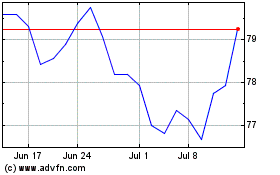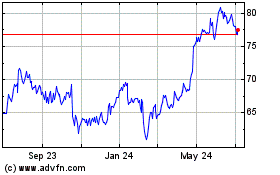AstraZeneca Vaccine Faces Fresh Ban in Germany for Under-60s -- Update
March 30 2021 - 1:10PM
Dow Jones News
By Bojan Pancevski
BERLIN -- Germany's vaccine authority will recommend the
government ban AstraZeneca PLC's Covid-19 vaccine for people
younger than 60 following fresh blood-clotting incidents among
recipients, an official at the country's disease-control agency
said Tuesday -- potentially presenting the country's sputtering
vaccine rollout with fresh delays.
The final decision on changing who may receive the AstraZeneca
vaccine rests with the federal government, but local authorities
from Berlin to Munich and individual hospitals elsewhere were
already anticipating a partial ban on Tuesday by withholding the
shot for younger recipients.
Like other European Union countries, Germany has struggled to
ramp up vaccinations amid a shortage of doses and bureaucratic and
logistical bottlenecks. Barring anyone under 60 from receiving the
shot could make it hard for the government to reach its revised
target of offering all residents a vaccine by the end of
September.
It could also exacerbate already widespread misgivings about the
vaccine. Germany originally authorized the shot only for those
under 65 due to a lack of data about efficacy in older age groups
before briefly banning it altogether for several days earlier in
March amid concerns about rare blood clotting incidents following
the injections.
Since its approval earlier this year, local authorities have
reported reluctance to take the shot among those eligible for
it.
The latest change in recommendation comes after authorities in
Germany recorded 31 cases of rare blood clotting in the brain among
the nearly 2.7 million people who had received the shot by Monday.
Nine people died, and all but two of the incidents affected women
aged 20 to 63, according to Germany's medicines regulator, the Paul
Ehrlich Institute.
"AstraZeneca continues to analyze its database on tens of
millions of records for COVID-19 Vaccine AstraZeneca to understand
whether these very rare cases of blood clots associated with
thrombocytopenia occur any more commonly than would be expected
naturally in a population of millions of people," a spokeswoman for
AstraZeneca said. "We will continue to work with German authorities
to address any questions they may have."
The new recommendation by the standing vaccination committee of
the Robert Koch Institute, Germany's center for disease control,
will be published by the end of the week. The government has so far
followed the recommendations of the committee.
The news comes as Germany is facing a sharp increase in Covid-19
infections despite imposing a succession of lockdowns since early
November. Chancellor Angela Merkel called an emergency conference
with the premiers of Germany's 16 states on Tuesday to discuss the
pandemic response, including the future use of the AstraZeneca
vaccine.
The European Union, of which Germany is a member, purchased 400
million doses from AstraZeneca and relies on the shot for about 30%
of its vaccination program.
Germany briefly suspended the AstraZeneca rollout earlier this
month after detecting seven cases of cerebral venous sinus
thrombosis or CVST, a very rare and potentially deadly condition
that causes blood clotting in the brain. France, Italy and other
countries also temporarily halted the use of the shot.
Vaccination in most European countries resumed however after the
European Medicines Agency, the EU drug regulator, ruled that the
vaccine was safe for general use.
Now, after the number of CVST incidents exceeded three dozen,
all of them people of working age, the German vaccine committee
decided to recommend against its use in younger people. Officials
of the German ministry of healthcare said that the expected
incidence of CVST would be about one case in 1.6 million.
Some nations, such as Norway, haven't resumed use of the vaccine
despite the EMA ruling and decided to wait for more research into
the origin of a condition that appears to affect primarily younger
women, a senior Norwegian healthcare official said.
Two medical teams in Germany and Norway separately concluded
that the CVST incidents, which are often followed by a condition
called thrombocytopenia, were caused by an autoimmune reaction
prompted by the vaccine. The German team of Andreas Greinacher,
professor of transfusion medicine at the Greifswald University
Clinic, published their findings in a study that is yet to be
peer-reviewed.
Prof. Greinacher's team examined nine cases from Germany and
Austria, and suggested that the incidents linked to the vaccine
resemble a rare disorder known as heparin-induced thrombocytopenia
or HIT, which they said is easily treatable with immunoglobulin and
blood-thinning medicine if identified promptly.
The AstraZeneca vaccine is "associated with development of a
prothrombotic disorder that clinically resembles heparin-induced
thrombocytopenia but which shows a different serological profile,"
their study stated.
The vaccine, the study argues, generates so-called
anti-PF4/heparin antibodies, which then activate thrombocytes that
cause blood clotting. The condition can be diagnosed and treated in
any midsize or larger clinic, Dr. Greinacher said last week.
Ms. Merkel called this week on Germany's state governments,
which have authority over most pandemic-fighting measures, to
tighten restrictions on the public to curb the current surge in
infections. Experts warned that the significant rise in new cases
was partly due to the so-called British coronavirus variant, which
is believed to be more infectious and possibly more deadly,
becoming dominant in Germany.
Write to Bojan Pancevski at bojan.pancevski@wsj.com
(END) Dow Jones Newswires
March 30, 2021 12:55 ET (16:55 GMT)
Copyright (c) 2021 Dow Jones & Company, Inc.
AstraZeneca (NASDAQ:AZN)
Historical Stock Chart
From Mar 2024 to Apr 2024

AstraZeneca (NASDAQ:AZN)
Historical Stock Chart
From Apr 2023 to Apr 2024
